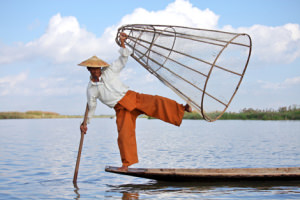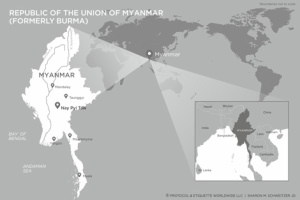 Today, I am thrilled to welcome as a new guest blogger, my brilliant colleague, Aquatic Biologist and Research Specialist, Ms. Kristen Eggers, who was indispensable to the success of Access to Asia.
Today, I am thrilled to welcome as a new guest blogger, my brilliant colleague, Aquatic Biologist and Research Specialist, Ms. Kristen Eggers, who was indispensable to the success of Access to Asia.
In all honesty, if someone had asked me a year ago to point out the country of Myanmar on a map, I would have scratched my head and been embarrassed to admit I didn’t know such a place existed. Fast forward through many months, as a researcher collaborating with the authors of Access to Asia, Sharon Schweitzer and Liz Alexander, and I can now say with confidence that I know considerably more about this fascinating nation.

When I recently stumbled upon the article, “What fishing in Myanmar means for the world,” I was thrilled to see my latest topic of interest, Asian economics, combined with my life-long passion, aquatic biology. The author Douglas N. Rader, Chief Oceans Scientist of the Environmental Defense Fund, masterfully sums up Myanmar’s past, present and future economic and environmental positioning. In addition, he highlights the country’s rich cultural heritage and bright outlook as a global power, together with a model for sustainable fishing.
Fascinating Facts
Did you know that Myanmar (pronounced mee-ahn-MAR), formerly known as Burma, is one of the largest fishing powers in the world? According to a study by the Food and Agriculture Organization (FAO) of the United Nations, it was the world’s 3rd largest inland waters fishing producer in 2014, and 10th largest for marine waters. Or did you know that the bordering Bay of Bengal is the largest bay in the world? And that the Ayeyarwady River, which runs through the center of the country, is among the top 100 largest? According to the FAO, Myanmar’s population of more than 50 million people depends on fish and fish products for almost a quarter of their total animal protein. Can you imagine the impact of this amount of fishing on local coral reefs and river ecosystems? And the importance of managing this industry efficiently? No wonder scientists, businesspeople and government figures worldwide are turning their attention to Myanmar.
Intercultural Awareness
However, for anyone interested in building relations with Myanmar, the importance of inter-cultural awareness cannot be emphasized enough. I noticed that some of the cross-cultural points Mr. Rader touched on in his article were ones that Sharon Schweitzer, and the interviewees she spoke with, highlighted in Access to Asia, as fundamental to understanding Myanmar’s culture. The following are two key tips for success to keep in mind before initiating business relationships or environmental efforts in Myanmar:
1. Respect Myanmar culture: The Myanmar are warm, welcoming people who will likely appreciate your insights and suggestions. However, valuing their culture and respecting their customs is more important than emphasizing your own. Ask questions and listen, before you speak.
2. Build strong partnerships: Although the Myanmar tend to be more individualistic than other Southeast Asians (according to Professor Charles Rarick of Purdue University Calumet in Indiana, USA), their society is founded on complex webs of relationships. Successful partnerships result from investing in long-term relationships and nurturing personal connections within the government and community.
Hope-filled Future
As many are recognizing, Myanmar’s position as a resource-rich, emerging market presents a unique opportunity to build from the ground up. Our hope is that the Myanmar people’s strength and determination, coupled with worldwide collaboration and support, will result in a thriving, well-functioning economy. In addition, from an environmental perspective, which is dear to my heart, I sincerely hope that everyone contributing to the country’s future will cultivate a mindset focused on sustainability and conservation of Myanmar’s abundant and breathtaking natural resources.
 Kristen Eggers is a Research Specialist with Protocol & Etiquette Worldwide who served as a contributing researcher for the multicultural guidebook, Access to Asia. She graduated from the University of California at Santa Barbara with a B.S. in Aquatic Biology and Cum Laude honors. Her love for the ocean has led her to conduct marine research with the Partnership for Interdisciplinary Studies of Coastal Oceans and the Surfrider Foundation. She also enjoys inspiring others about science and world cultures through her research and writing, as well as education and outreach programs. Feel free to connect with Kristen at www.linkedin.com/in/kristeneggers or follow her on Twitter at www.twitter.com/kristen_eggers8.
Kristen Eggers is a Research Specialist with Protocol & Etiquette Worldwide who served as a contributing researcher for the multicultural guidebook, Access to Asia. She graduated from the University of California at Santa Barbara with a B.S. in Aquatic Biology and Cum Laude honors. Her love for the ocean has led her to conduct marine research with the Partnership for Interdisciplinary Studies of Coastal Oceans and the Surfrider Foundation. She also enjoys inspiring others about science and world cultures through her research and writing, as well as education and outreach programs. Feel free to connect with Kristen at www.linkedin.com/in/kristeneggers or follow her on Twitter at www.twitter.com/kristen_eggers8.

Leave A Comment